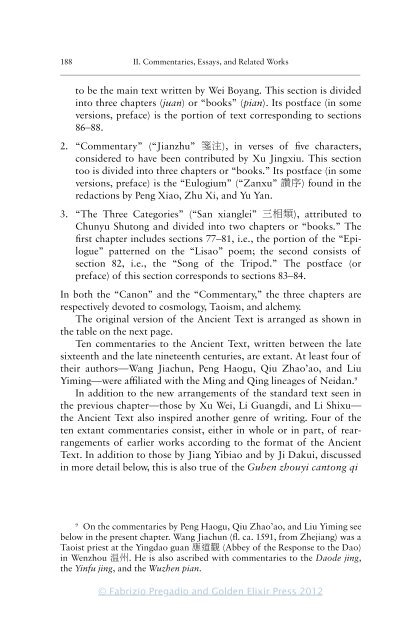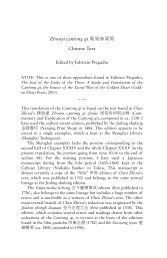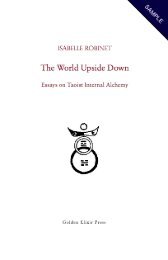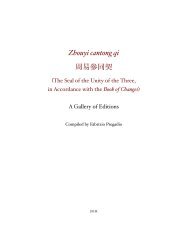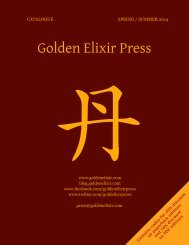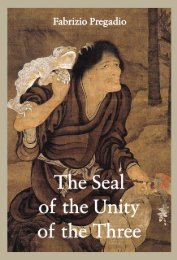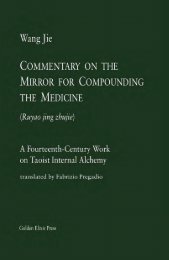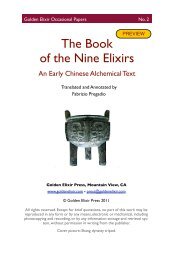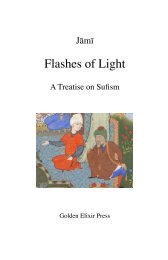The Seal of the Unity of the Three â Vol. 2 - The Golden Elixir
The Seal of the Unity of the Three â Vol. 2 - The Golden Elixir
The Seal of the Unity of the Three â Vol. 2 - The Golden Elixir
- No tags were found...
Create successful ePaper yourself
Turn your PDF publications into a flip-book with our unique Google optimized e-Paper software.
188 II. Commentaries, Essays, and Related Works<br />
—————————————————————————————————————————<br />
to be <strong>the</strong> main text written by Wei Boyang. This section is divided<br />
into three chapters (juan) or “books” (pian). Its postface (in some<br />
versions, preface) is <strong>the</strong> portion <strong>of</strong> text corresponding to sections<br />
86–88.<br />
2. “Commentary” (“Jianzhu” 箋 注 ), in verses <strong>of</strong> five characters,<br />
considered to have been contributed by Xu Jingxiu. This section<br />
too is divided into three chapters or “books.” Its postface (in some<br />
versions, preface) is <strong>the</strong> “Eulogium” (“Zanxu” 讚 序 ) found in <strong>the</strong><br />
redactions by Peng Xiao, Zhu Xi, and Yu Yan.<br />
3. “<strong>The</strong> <strong>Three</strong> Categories” (“San xianglei” 三 相 類 ), attributed to<br />
Chunyu Shutong and divided into two chapters or “books.” <strong>The</strong><br />
first chapter includes sections 77–81, i.e., <strong>the</strong> portion <strong>of</strong> <strong>the</strong> “Epilogue”<br />
patterned on <strong>the</strong> “Lisao” poem; <strong>the</strong> second consists <strong>of</strong><br />
section 82, i.e., <strong>the</strong> “Song <strong>of</strong> <strong>the</strong> Tripod.” <strong>The</strong> postface (or<br />
preface) <strong>of</strong> this section corresponds to sections 83–84.<br />
In both <strong>the</strong> “Canon” and <strong>the</strong> “Commentary,” <strong>the</strong> three chapters are<br />
respectively devoted to cosmology, Taoism, and alchemy.<br />
<strong>The</strong> original version <strong>of</strong> <strong>the</strong> Ancient Text is arranged as shown in<br />
<strong>the</strong> table on <strong>the</strong> next page.<br />
Ten commentaries to <strong>the</strong> Ancient Text, written between <strong>the</strong> late<br />
sixteenth and <strong>the</strong> late nineteenth centuries, are extant. At least four <strong>of</strong><br />
<strong>the</strong>ir authors—Wang Jiachun, Peng Haogu, Qiu Zhao’ao, and Liu<br />
Yiming—were affiliated with <strong>the</strong> Ming and Qing lineages <strong>of</strong> Neidan. 9<br />
In addition to <strong>the</strong> new arrangements <strong>of</strong> <strong>the</strong> standard text seen in<br />
<strong>the</strong> previous chapter—those by Xu Wei, Li Guangdi, and Li Shixu—<br />
<strong>the</strong> Ancient Text also inspired ano<strong>the</strong>r genre <strong>of</strong> writing. Four <strong>of</strong> <strong>the</strong><br />
ten extant commentaries consist, ei<strong>the</strong>r in whole or in part, <strong>of</strong> rearrangements<br />
<strong>of</strong> earlier works according to <strong>the</strong> format <strong>of</strong> <strong>the</strong> Ancient<br />
Text. In addition to those by Jiang Yibiao and by Ji Dakui, discussed<br />
in more detail below, this is also true <strong>of</strong> <strong>the</strong> Guben zhouyi cantong qi<br />
9<br />
On <strong>the</strong> commentaries by Peng Haogu, Qiu Zhao’ao, and Liu Yiming see<br />
below in <strong>the</strong> present chapter. Wang Jiachun (fl. ca. 1591, from Zhejiang) was a<br />
Taoist priest at <strong>the</strong> Yingdao guan 應 道 觀 (Abbey <strong>of</strong> <strong>the</strong> Response to <strong>the</strong> Dao)<br />
in Wenzhou 温 州 . He is also ascribed with commentaries to <strong>the</strong> Daode jing,<br />
<strong>the</strong> Yinfu jing, and <strong>the</strong> Wuzhen pian.<br />
© Fabrizio Pregadio and <strong>Golden</strong> <strong>Elixir</strong> Press 2012


